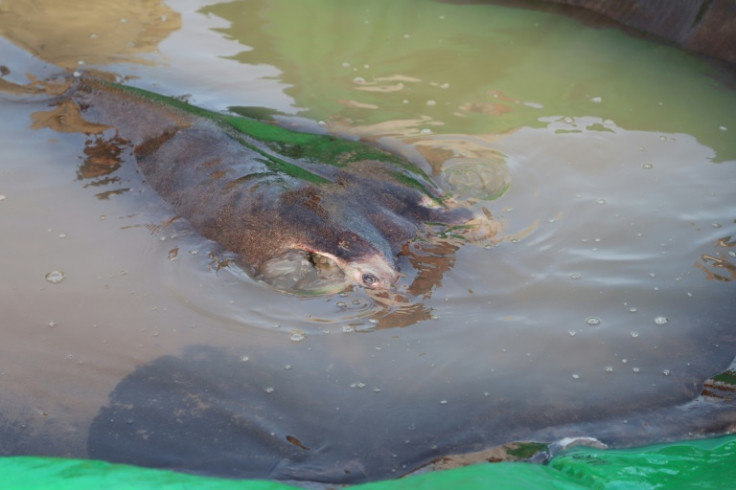Cambodian fisherman catches world's largest recorded freshwater fish
The video of the huge stingray caught in Cambodia has gone viral on social media.
A 13-foot-long and 300 kg (661 lb) stingray caught by a fisherman in the Mekong River of Cambodia is the world's largest recorded freshwater fish, per scientists.
The giant fish was caught on June 13 on a small river island called Koh Preah and was hauled ashore by fishers so it could be weighed and checked. The previous record for the world's largest freshwater fish was held by a 293-kg (646-lb) Mekong giant catfish, found in Thailand in 2005.
The discovery came less than a month after another giant stingray weighing 400 pounds was found by fishermen. The species of giant stingray that has been caught in Cambodia has an extremely dangerous venomous barb that can reach nearly a foot in length, per a report in The New York Times.
U.S. and Cambodian scientists say the world's largest ever freshwater fish—a stingray measuring nearly 13 feet long— was caught in Cambodia's Mekong River.
— ABC News (@ABC) June 20, 2022
The giant fish was tagged and released back into the wild. https://t.co/BMX8P1NOr6 pic.twitter.com/dPOuVz0i6A
The latest discovery has come as a ray of hope for the scientific community worldwide. Overfishing, dams and pollution have threatened the survival of many species found in the Mekong River.
According to scientists, big fish are endangered and high-value species globally, and 70 percent of giant freshwater fish are threatened with extinction.
The Mekong, a river rich in biodiversity, flows through China, Myanmar, Laos, Thailand, Cambodia, and Vietnam. It is also home to freshwater dolphins, giant soft-shell turtles, giant catfish, and giant barbs.
"In 20 years of researching giant fish in rivers and lakes on six continents, this is the largest freshwater fish that we've encountered or that's been documented anywhere worldwide," said Zeb Hogan, a biologist who leads Wonders of the Mekong, a joint Cambodian-US conservation project.
"Finding and documenting this fish is remarkable, and a rare positive sign of hope, even more so because it occurred in the Mekong, a river that's currently facing many challenges," added Dr. Hogan.
The team that had rushed to the site released the fish back into the waters after inserting an acoustic tag near its tail to track its movement for further research. The fisherman who had caught the fish and informed the scientist has also been compensated for his catch at the market rate.























